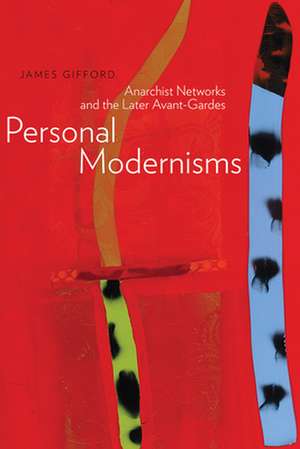Personal Modernisms: Anarchist Networks and the Later Avant-Gardes
Autor Dr. James Gifforden Limba Engleză Paperback – 23 sep 2014
Preț: 200.45 lei
Preț vechi: 231.78 lei
-14% Nou
Puncte Express: 301
Preț estimativ în valută:
38.36€ • 40.05$ • 31.74£
38.36€ • 40.05$ • 31.74£
Carte disponibilă
Livrare economică 15-29 martie
Preluare comenzi: 021 569.72.76
Specificații
ISBN-13: 9781772120011
ISBN-10: 1772120014
Pagini: 320
Dimensiuni: 152 x 228 x 20 mm
Greutate: 0.48 kg
Editura: University of Alberta Press
Colecția University of Alberta Press (CA)
ISBN-10: 1772120014
Pagini: 320
Dimensiuni: 152 x 228 x 20 mm
Greutate: 0.48 kg
Editura: University of Alberta Press
Colecția University of Alberta Press (CA)
Recenzii
"An extraordinary and impressive literary analysis in both scope and presentation, Personal Modernisms: Anarchist Networks and the Later Avant-Gardes is a seminal work that is enhanced with the inclusion of 22 pages of Notes, 20 pages of Works Cited, and a comprehensive Index. Personal Modernisms: Anarchist Networks and the Later Avant-Gardes should be a part of every academic library 20th Century Literary Studies reference collection in general, and the supplemental studies reading lists for students of Canadian Literary Studies in particular." -- Carl Logan -- 20141201
James Giffords Personal Modernisms is the first in-depth account of the personalist English literary network in the pre- and post-World War II gap (xvii). Gifford illuminates the interbellum period, where he argues that artists like Henry Miller, Lawrence Durrell, David Gascoyne, Elizabeth Smart, and Alfred Perlès merit significantly more scholarly attention and readership. Emphasizing the relevance of English literature outside the British Isles, Gifford examines a movement which he calls Personalism, and underscores the profound impact that this less renown network made on generations of writers to follow. With a plethora of detail and history, which contextualizes the personalist network, Giffords Personal Modernisms offers something of value to a wide range of readers, from those hoping to discover more about these understudied writers, to others interested in the literary milieu of the 1930s and 40s. Sheena Jarry, ILDS Herald, May 25, 2015
"...Gifford makes a persuasive case.... Engaged in a 'struggle against definition,' the Personalists were perhaps victims of their own success. Certainly, they feel like a missing link in the established narrative. In this metacritical study, however, Gifford shows how literary works must always flow through the authoritarian structure of institutionswhich might explain why these anti-authoritarian writers have suffered such neglect." Ian Pindar, Times Literary Supplement, April 3, 2015
"James Gifford provides plenty of food for thought in his survey of the poets of the New Apocalypse, New Romantics, Personalist movement. Or should it be movements? They are, as he rightly says, mostly overlooked, either by design or accident, in many works of criticism and in university courses. Opinion may differ about the reasons for that, but the historical record of their existence does need to be correctly established, and Gifford's book is a step in the right direction." [Full review at http://www.pennilesspress.co.uk/NRB/personal_modernisms.htm] -- Jim Burns -- The Northern Review of Books, 20150601
"Emphasizing the relevance of English literature outside the British Isles, Gifford examines a network he calls the "personalists" (xi), underscoring the impact of this less renowned, yet incredibly influential group of writers, which had a profound effect on the generations of artists that followed them. Gifford not only diminishes the anonymity of many personalist writers, but also links the artistic production of this trans-continental literary network with a common thread: an antiauthoritarian outlook on life and art.... With a plethora of detail and an extensive history that contextualizes the personalist network, Gifford's Personal Modernisms offers something of value to a wide range of readers, from those hoping to discover more about this rather forgotten period of literature, to others interested in pursuing more specialized research on late Modernism or the pre- and post-war literary milieu." [Full article at http://inquire.streetmag.org/articles/161] -- Sheena Jary -- Inquire Journal of Comparative Literature, 20151105
Personal Modernisms is an original and thought-provoking study of a network of Late Modernists in Europe, China, and North America.... [Gifford's] examination involves, among other things, a comprehensive overview of the critical blinders that have hampered our understanding of the "Personalists" (a circle of poets, writers, and critics who promoted their tendency as "New Apocalypse," "Personalist," and "New Romantic") in the current literature.... Gifford's purpose is to configure our understanding of Late Modernism through the concerns of World War Two era anarchist-oriented poets, critics, and novelists." Allan Antliff, English Studies in Canada, December 2015
Personal Modernisms is intended as a starting point for reassessing and repositioning an often-overlooked group of artists who produced a meaningful body of work during the inter-war and WWII period [B]y altering the perspective through which these personalist writers have been compartmentalized and sidelined, in many cases, he has generated a reformed platform for exploring these anarchist networks. Wayne Arnold, American Studies, Vol 55, No 2, 2016
James Giffords Personal Modernisms is the first in-depth account of the personalist English literary network in the pre- and post-World War II gap (xvii). Gifford illuminates the interbellum period, where he argues that artists like Henry Miller, Lawrence Durrell, David Gascoyne, Elizabeth Smart, and Alfred Perlès merit significantly more scholarly attention and readership. Emphasizing the relevance of English literature outside the British Isles, Gifford examines a movement which he calls Personalism, and underscores the profound impact that this less renown network made on generations of writers to follow. With a plethora of detail and history, which contextualizes the personalist network, Giffords Personal Modernisms offers something of value to a wide range of readers, from those hoping to discover more about these understudied writers, to others interested in the literary milieu of the 1930s and 40s. Sheena Jarry, ILDS Herald, May 25, 2015
"...Gifford makes a persuasive case.... Engaged in a 'struggle against definition,' the Personalists were perhaps victims of their own success. Certainly, they feel like a missing link in the established narrative. In this metacritical study, however, Gifford shows how literary works must always flow through the authoritarian structure of institutionswhich might explain why these anti-authoritarian writers have suffered such neglect." Ian Pindar, Times Literary Supplement, April 3, 2015
"James Gifford provides plenty of food for thought in his survey of the poets of the New Apocalypse, New Romantics, Personalist movement. Or should it be movements? They are, as he rightly says, mostly overlooked, either by design or accident, in many works of criticism and in university courses. Opinion may differ about the reasons for that, but the historical record of their existence does need to be correctly established, and Gifford's book is a step in the right direction." [Full review at http://www.pennilesspress.co.uk/NRB/personal_modernisms.htm] -- Jim Burns -- The Northern Review of Books, 20150601
"Emphasizing the relevance of English literature outside the British Isles, Gifford examines a network he calls the "personalists" (xi), underscoring the impact of this less renowned, yet incredibly influential group of writers, which had a profound effect on the generations of artists that followed them. Gifford not only diminishes the anonymity of many personalist writers, but also links the artistic production of this trans-continental literary network with a common thread: an antiauthoritarian outlook on life and art.... With a plethora of detail and an extensive history that contextualizes the personalist network, Gifford's Personal Modernisms offers something of value to a wide range of readers, from those hoping to discover more about this rather forgotten period of literature, to others interested in pursuing more specialized research on late Modernism or the pre- and post-war literary milieu." [Full article at http://inquire.streetmag.org/articles/161] -- Sheena Jary -- Inquire Journal of Comparative Literature, 20151105
Personal Modernisms is an original and thought-provoking study of a network of Late Modernists in Europe, China, and North America.... [Gifford's] examination involves, among other things, a comprehensive overview of the critical blinders that have hampered our understanding of the "Personalists" (a circle of poets, writers, and critics who promoted their tendency as "New Apocalypse," "Personalist," and "New Romantic") in the current literature.... Gifford's purpose is to configure our understanding of Late Modernism through the concerns of World War Two era anarchist-oriented poets, critics, and novelists." Allan Antliff, English Studies in Canada, December 2015
Personal Modernisms is intended as a starting point for reassessing and repositioning an often-overlooked group of artists who produced a meaningful body of work during the inter-war and WWII period [B]y altering the perspective through which these personalist writers have been compartmentalized and sidelined, in many cases, he has generated a reformed platform for exploring these anarchist networks. Wayne Arnold, American Studies, Vol 55, No 2, 2016











